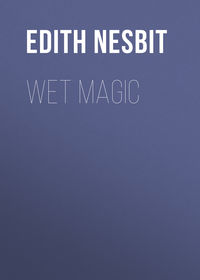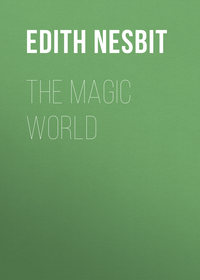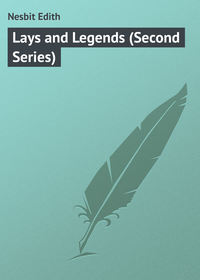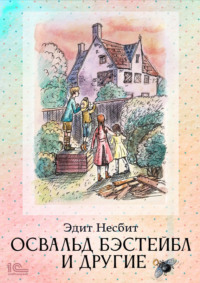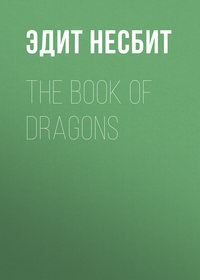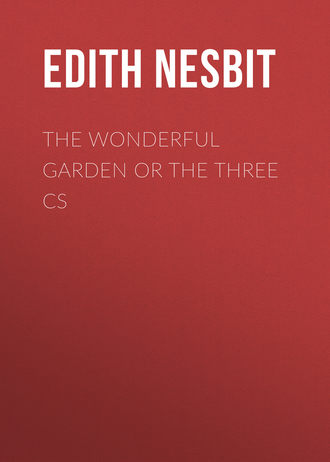 полная версия
полная версияThe Wonderful Garden or The Three Cs
‘Well, beany or no beany, you don’t see ’im to-night. Off with you. I’ll see ’e’s all right. Yes, you can leave the grub. You come ’bout eight in the morning if you can, and then we’ll see.’
It was a disappointed party that returned to the dining-room.
‘I did think it would be different,’ said Charlotte. ‘It’s all so dull. And it’ll go on being like this for weeks.’
‘It’s the dreadful anxiousness I don’t like,’ said Caroline. ‘The clergyman said secrets were awkward pets to keep, and they are.’
‘Why is everything always different from what it was when you thought it was always going to be the same?’ Charlotte asked, with the air of an inquiring philosopher.
‘You see,’ said Caroline, ‘we are rather young for rescues.’
‘Yes, but,’ Charles urged, ‘we couldn’t do anything except rescue. We can’t do anything else now, however young we are.’
They talked about it for an hour, and said the same things over and over, and then Mr. Penfold came in to say good-bye.
‘I’m translating that book. I’m getting on with it,’ he said; ‘it’s most interesting. I’ve got some of the manuscript in my pocket.’
‘Oh do let us look!’ they all said at once.
‘Well, just one page then, only one, or I shall be late for the choir practice.’
He laid down a type-written page and they all sprawled over the table to read it.
‘To obtain your suit,’ it said. ‘Herbs favourable to the granting of petitions…’ There was a blank for the names of the herbs, which Mr. Penfold hadn’t yet had time, he told them, to translate.
‘Suitors to kings and those in high places shall note well these herbs,’ the translation went on, ‘and offer the flowers and leaves in bunches or garlands when they go to tender their suit. More efficacious it is, however, if the herbs be bruised and their juices expressed, and a decoction given to drink in a little warm sack or strong waters or any liquor convenient. But for this ye need interest with the household of the king or him who has the granting of the desire. These herbs have the virtue to incline the heart favourably towards suitors if gathered in the first quarter of Luna by the hand of the petitioner in his proper person.’
That was the end of the page. The children had to own that they couldn’t understand it.
‘Oh,’ said the Unusual One, ‘it only means if you’re going to ask a favour of any one. One of the herbs was balsam, I believe. Now I must fly. Keep the page till to-morrow if you like.’
They did like. And when he was gone Charlotte spoke.
‘Look here. We shall have to tell the Uncle. Let’s decoct him some balsam and then tell him.’
But the others wouldn’t hear of it. They had to hear of it, however, next day, when at twelve o’clock William allowed them to visit Rupert in his loft. Rupert’s eyes were very bright and his hands were very hot, and he coughed almost all the time – a very little cough, but most persevering.
‘William,’ Caroline came down the ladder to say, ‘we must tell uncle. I’m sure Rupert’s ill. He ought to have a doctor.’
‘You’re right, Miss,’ William replied, ‘What did I tell you from the first?’
Caroline expected stern opposition from Rupert, and even feared that he might say that rather than have his secret given to an uncle he would indeed run away to sea. But he only turned his head restlessly on the straw and said, ‘Oh, I don’t care! Do what you like.’
The day was, most fortunately, fine. So after dinner they all went into the garden to get the balsam. But they couldn’t find any balsam.
‘I’ll get the Language Of,’ said Caroline, ‘and we’ll take the herbs that seem most likely to make a person do what you want.’
In finding suitable ‘herbs,’ first in the book and then in the garden, the time went quickly: there was a good deal of talk, of course.
‘I really don’t think we need worry,’ said Caroline again and again. ‘I think with the herbs it’s sure to be all right, and the Uncle will let us keep him.’ She spoke as if Rupert were a stray kitten or an ownerless puppy. ‘You see the fern-seed came right, and the sorry bouquet we gave to the Wilmington came right, and you’ll see this will. We’ll give him some in his tea as well as the bouquet, and that’ll make quite certain.’
‘It’s all nonsense,’ said Charlotte. ‘Besides, he’ll spit it out. I know I should. You can lead an uncle to the teapot but you can’t make him drink.’
‘We’ll have calceolaria,’ Caroline finally decided, ‘because it means “I offer you pecuniary aid,” or “I offer you my fortune”; and, of course, Rupert’ll cost something to keep. And double china aster, if we can find it, because it means “I share your sentiments.” Straw means agreement, so we’ll have that too. It needn’t show in the bouquet. And eschscholtzia, because that signifies “do not refuse me.”’
They got the calceolarias and the eschscholtzias, but the gardener said the asters weren’t out yet.
‘It’s only two flowers,’ said Charlotte; ‘suppose we wear something in our button-holes to mean “we trust in you”?’
Nothing meaning just that, however, could be found in the book. The nearest was heliotrope, ‘I turn to thee,’ and rhododendron, ‘danger.’ A bouquet of rhododendron and heliotrope was, however, found to be incompatible with the human button-hole, so these flowers were added to the Uncle’s bouquet.
‘And now,’ said Charlotte, ‘let’s go in and express the juices. We can’t chew them this time, because it would be disgusting.’
‘Scissors and tea, I think,’ Charles said, and this bright suggestion was acted on.
The Unusual Clergyman was perhaps partly to blame for what followed. Calceolaria, rhododendron, and eschscholtzia (a word I spell with the greatest pain and difficulty) were cut up very fine indeed with Caroline’s nail-scissors, and secreted in Charles’s handkerchief – a clean one fetched down for the purpose. When the tea-tray was brought in, and the maid had gone to ring the bell which summons uncles, the lid of the teapot was hurriedly raised and a good handful of chopped leaves and petals thrust in.
The magic bouquet was placed on the Uncle’s plate.
He came in, pale and shadowy as ever, and yet looking, the children thought, somewhat different, and took up the bouquet. It was rather an odd one. The eschscholtzias were drooping miserably among the strong rhododendrons; so was the heliotrope. And the calceolarias seemed shrivelled and unhappy; and the straw, of which in his enthusiasm Charles had brought a large double handful, showed much more than Caroline had meant it to.
‘What’s all this, eh?’ the Uncle asked.
‘It’s a sym-what’s-its-name bouquet.’
‘Simple?’ asked the Uncle; ‘it’s anything but that. Sympathetic?’
‘No,’ said Charlotte, ‘sym-what Mr. Penfold was saying to you yesterday about magic.’
‘Symbolic. I see. And what does it symbolise?’ he asked kindly, but without smiling.
‘We’ll tell you when you’ve had your tea,’ they all agreed in saying.
The Uncle sniffed the bouquet, and that was perhaps why he did not sniff the tea. They wondered how he could possibly not smell it, for as Caroline poured it out it seemed to fill the room with its strange mixed scent. However, he just stirred it and talked about the weather, not at all amusingly, and presently he lifted the cup to his lips.
Six anxious eyes followed his every movement; and his movements from the moment the tea entered his mouth were brisk and unusual. He screwed up his nose in a way that at any less important moment would have been funny, went quickly to the window, leaned out, and did exactly what Charlotte had said he would do.
‘Excuse me,’ he said, coming back to the table and taking up the cup; ‘I beg your pardon for that natural if impolite action. I think this tea must be poisoned. Don’t drink any of it, and please ring the bell. I must inquire into this.’
Nobody moved.
‘We aren’t going to drink any,’ said Charles.
‘Oh, don’t inquire!’ said Charlotte anxiously.
‘Was it very horrid?’ asked Caroline. ‘I am so sorry.’
‘Will you kindly ring?’ the Uncle asked coldly. It was a terrible moment, but Caroline met it bravely.
‘No,’ she said; ‘don’t ask the servants, please, uncle; it’s not their fault. We put the stuff in the teapot.’
‘You put poison in the teapot? For me?’ The Uncle suddenly sat down.
‘No, no, dear uncle,’ cried Caroline; ‘not poison. Only calceolaria and eschscholtzia and straw and rhododendron; it isn’t poison. It’s just a little magic spell to make you say “Yes” to what we want.’
‘Have I given you reason to suppose that I could not grant your requirements without spells?’ he asked severely.
‘Oh no! But we wanted to make sure.’
Charlotte held out the translation and the Uncle read it.
‘But this doesn’t say calceolaria and all the rest of it,’ he objected.
‘No, it doesn’t say. That’s just it. So we had to get the nearest things we could. Straw for agreement, because we want you to agree to what we want; and calceolaria, because it means “I offer you pecuniary aid”; and rhododendron to show it’s dangerous not to; and es-what’s-its-name for “do not refuse me.”’
‘Do not refuse you what?’ said the Uncle in an exasperated voice.
The three of them looked at each other and two of them said, ‘You tell, Caro.’
Caroline clasped her hands very tight, and drew a long breath, and said very fast indeed:
‘There was a boy ran away from school called Rupert his master was cruel to him and he came here and we hid him and put the Police off the scent and he’s such a nice boy and his father’s in India like ours and he’s in the straw-loft now with such a dreadful cold and I know the doctor ought to be sent for and if you give him back to that Murdstone man I know he’ll die and I can’t bear it and I’m very very sorry it was silly putting the stuff in your tea but we weren’t taking any chances and if you’re angry about the tea do punish us but stick to Rupert and oh uncle I don’t know what to say but what would you have done if you’d been us?’
‘There, there,’ said the Uncle gently, and not seeming as surprised as they expected; ‘don’t cry. Don’t you begin,’ he added with more sternness to Charles, who was becoming subject to sniffs. ‘There, go and wash your faces. We’ll have some fresh tea made in another pot, and talk it over.’
‘It’s hopeful, I tell you,’ said Caroline, washing her face; ‘he’s not said “No.” Oh, I believe the spell’s working. Stop snivelling, Charlotte. There’s nothing to cry about, yet.’
‘You began,’ said Charlotte truthfully.
‘I didn’t,’ said Caroline; ‘and if I did, you put it all on to me, and I didn’t know what I was saying or doing. Come on down. We mustn’t let him think it over by himself too long.’
Over tea, for which nobody felt very hungry, the Uncle asked many questions, and heard the full story of the escape and the Royal Order of the Secret Rose.
‘And don’t blame William, will you?’ Charlotte begged; ‘because he’s done nothing but say tell you ever since it began.’
‘I shall not blame William,’ said the Uncle.
‘I wanted to tell you,’ said Caroline; ‘at least next day I did, but it wasn’t my secret. And Rupert agreed for us to tell now.’
Tea was over and there was a silence. Uncle Charles was looking from one to another of the children.
‘And you really believed,’ he said slowly, ‘that putting that abominable stuff in my tea would make me agree to keep your runaway boy?’
‘There was the fern-seed, you know,’ said Charlotte; ‘and it said in the book that the decoction of balsam would make you grant our desire, and calceolaria’s as good as balsam any day.’
‘And you really thought it would?’
‘Won’t it?’ asked Caroline, and her eyes filled with tears. ‘Oh, uncle, if you only knew how I hated giving you that horrid stuff instead of your nice tea. It hurt me far more than it did you.’
The Uncle laughed faintly, but he did laugh.
‘Then you will grant our desire,’ cried Charlotte. ‘You couldn’t laugh if you weren’t going to. So you see the herbs did do the magic.’
‘Something seems to have done it,’ said the Uncle. ‘You had better give me a red rose and two buds and enrol me as a member of your Royal Order of the Secret Rose.’ He found himself suddenly involved in a violent threefold embrace.
‘I will give you a word of advice,’ he said, settling his neck-tie when it was over. ‘Never try to administer philtres or potions inwardly. Outward application is quite as efficacious. Indeed I am not sure but what your bouquet was in itself enough to work the spell. Something has certainly worked it. For I may now tell you that Mrs. Wilmington had her suspicions, and by a stratagem surprised the secret this afternoon. She told me and wished to send for the Police. But I heard William’s story, and decided not to send for the Police till after tea. But now Mrs. Wilmington has seen the boy, you may as well make her a Royal Rose too. She will not betray you.’
The children looked at each other amazed.
Mrs. Wilmington? It was unbelievable.
‘The doctor is coming at once,’ said the Uncle. ‘I hope it isn’t measles.’
‘Then, if we hadn’t spelled you, should you have given him up to the Police?’ Caroline asked.
‘Your telling me, or the spell, or something has stopped that. Now run away and play in the park. If the illness is not infectious you shall see your little friend later.’
‘Oh, uncle,’ said Charlotte in heartfelt tones, ‘it’s a long lane that never rejoices. We have been so sick about it. And now it’s all right. And you are a dear.’
‘The dearest dear,’ corrected Caroline.
‘I call him a brick,’ said Charles, with the air of a man of the world.
‘There’s only one thing more,’ said the Uncle; ‘go and get me that red rose, and then I shall know that you’ll let me into the next really important secret you have.’
They ran to get it, and the Uncle took it and the petition bouquet away with him to his study.
When the doctor had paid his visit they were allowed to see Rupert for a few minutes before bedtime – not in the straw-loft as they had expected, but in the blue room, which is hung with tapestry, and has blue silk curtains to windows and four-poster.
‘They brought me in at tea-time,’ Rupert told them. ‘That Mrs. Wilmington of yours is first-class. I don’t know what you meant by saying she was a rotter. And your uncle – isn’t he a brick?’
Charles was glad he had thought of that word himself, Rupert’s using it showed it was the correct thing to say.
‘I’m jolly glad you told him,’ Rupert went on. ‘Of course we couldn’t have gone on the other way. And he’s sent a telegram a mile long to my people in India to ask whether I mayn’t stay on here till school begins again.’
‘How splendid,’ said Charlotte, awe-struck; ‘how awfully splendid! I didn’t think uncles could be like that.’
‘Uncles are all right,’ said Rupert, ‘if you treat them properly.’
Then he began to cough, and Mrs. Wilmington came in with lemonade and honey, and told the others that they were tiring him, and it was bedtime anyhow.
‘If you treat them properly,’ said Charlotte dreamily, as she brushed her hair, ‘uncles are all right. Do you think he would have been all right if we hadn’t treated him just as we did?’
‘No,’ said Caroline. ‘Just unhook me, will you, Char? I don’t. I think it was the spell.’
‘So do I,’ said Charlotte. ‘Stand still or I can’t unhook you. What the eye doesn’t see, the hook doesn’t come out of. I expect the tea was like what Miss Peckitt’s sister’s mistress had when their house was burglared – nervous shock. I expect that is the same as electric shocks making people walk that couldn’t before. I expect the nervous shock made that part of uncle that grants favours wake up and walk, don’t you?’
‘You make haste into bed,’ said Caroline. ‘What’s the good of talking all round it? We did what it said in the book, and it happened like it said in the book it would happen. I believe you could manage everything with spells if you only knew the proper ones. When I grow up I shall be a professoress of magic spells and have my business office in a beautiful palace, and kings and queens will come in their golden chariots to ask me what spells they ought to do to make their subjects happy and not poor, and for everybody to have a chicken in the pot, and – ’
‘Talk about talking!’ said Charlotte. ‘Come along to bed; do.’
CHAPTER XI
THE ROSICURIANS
The door of the drawing-room at the Manor House was kept locked, and Mrs. Wilmington dusted the room herself and carried its key in her pocket. After the Uncle had said that about Mrs. Wilmington having expected the children to break everything in the house, the three C.’s began to wonder whether the drawing-room had always been kept in this locked-up state, or whether it was only done on their account.
‘Out of compliment to us,’ as Charles put it.
‘I almost think it must be that,’ Caroline said; ‘because of course drawing-rooms are for people to sit in, and the Wilmington must expect some one to sit in it or she wouldn’t dust it so carefully.’
‘I looked in the other day when she was dusting,’ said Charlotte. ‘I couldn’t see much just a bit of the carpet, pink and grey and pretty, and the corner of a black cupboard-thing with trees and birds and gold Chinamen on it, and a table with a soup tureen with red rabbits’ heads for handles, and a round looking-glass that you could see some more of the room in, all tiny and all drawn wrong somehow – you know the sort; convict mirrors, Harriet says they are. I asked her.’
‘When?’ said Charles.
‘Oh, I don’t know. Just after. And Harriet goes in to sweep it. She says its full of lovelies.’
‘Why don’t you ask her if it was shut up out of compliment to us?’ Charles asked.
‘Because I wasn’t going to put ideas into Harriet’s head, of course.’
And Caroline agreed that such a question would have been simply giving themselves away.
Each of the three C.’s had turned the handle of the drawing-room door many times to see whether by chance Mrs. Wilmington had just this once not remembered to lock it. But she always had. And their interest in the room had steadily grown. And now here was another wet day, just the day for examining golden Chinamen and looking at yourself in convex mirrors; and the room was locked up so that no one could enjoy these advantages.
Rupert was still in bed, the doctor had decided against measles; but the feverish cold which had given rise to the measle idea was still too bad for Rupert to be anywhere but where he was. And the others were only allowed to see him for a few minutes at a time. Mrs. Wilmington had, so Harriet explained, ‘taken to the new young gentleman in a way you’d hardly believe,’ and was spending the afternoon reading Masterman Ready to him after a baffled attempt to read him Eric, or Little by Little, which she fetched from her own room on purpose, and which Rupert stopped his ears with his fingers rather than listen to.
‘It is the time,’ said Charlotte; ‘there is a time in the affairs of men that they call the Nick. And this is it. Let’s try to get in. The Wilmington is safely out of the way. Let’s!’
‘Yes, let’s,’ said Charles.
‘No, don’t let’s,’ said Caroline. ‘The Uncle mightn’t want us to. Perhaps compliments to us aren’t the real reason. Perhaps there’s some wonderful secret kept in there, known only to the head of the house and his faithful Wilmington. The Uncle’s been so jolly decent. Let’s ask the Wilmington for the key.’
The others laughed, and Charles said, ‘You know well enough that’s no earthly.’
Caroline did not think there could be a secret, because the Uncle was now a member of the Royal Order of the Secret Rose, whose unchangeable motto was ‘halves in all secrets.’
‘So if there’d been anything like that he’d have told us without preservation,’ Charles added. ‘Yes, I agree with Caro.’
‘And,’ said Charlotte, ‘I don’t see – Oh, I say, I’ve got an idea! Let’s have another hunt for that second book the Lady in the picture’s got under her elbow. We really ought to find it. It’s a sacred duty we owe the Uncle for being so decent about Rupert.’
‘The drawing-room door’s knob is just the same as this one’s,’ Charles pointed out; ‘and the morning-room’s and the library’s door knobs are the same too. Let’s see if this key won’t fit the drawing-room.’ He rattled the key of the dining-room door as he spoke.
‘I wish you wouldn’t,’ said Caroline. ‘It’s jolly rough on me. Everybody always blames the eldest. I wish you’d been the eldest, Charles.’
‘I would have if I could, you bet,’ said Charles. ‘Come on.’
‘No, look here,’ said Caroline desperately, ‘please don’t. And I’ll go and ask uncle if we mayn’t. There!’
‘But we’re forbidden to disturb him.’
‘I’d rather disturb him than go poking into places he doesn’t want us to go poking into. Don’t you see? If he doesn’t mind us going in he’ll say “Yes,” and if he does mind he’ll say “No,” and then we shall be glad we didn’t without asking him.’
‘But what could be in there that he doesn’t want us to see?’ Charles wanted to know.
‘Oh, anything! Clouds of live butterflies that are let out after lunch, and go back to their cages when the tea-bell rings. I think Caro’s right about asking the Uncle,’ Charlotte said.
‘Butterflies are simply piffle,’ Charles pointed out. ‘They’d be laying their eggs all over everything and turning into cocoons all the time. I know, because of silkworms.’
‘Well, a snake then,’ said Charlotte briskly: ‘an enormous king-serpent, with a crown on its head, and yards and yards long, that comes out of a cupboard from two to four every day, and twines pieces of itself round the legs of the furniture, or your legs if you go in. It wouldn’t mind what legs they were it twined round, I expect.’
‘I like snakes,’ said Charles briefly. ‘Let Caro go to the Uncle if she wants to.’
They all went. It was deemed respectful to wash a little.
‘They like you to be clean when you ask for things,’ said Caroline.
‘It’s always “wash!” whatever you do,’ Charlotte complained. ‘While there’s life there’s soap.’ But she washed too.
There was an agitated pause on the sheepskin mat outside the Uncle’s study door.
‘Shall we knock?’ Charles asked.
‘You don’t knock at sitting-room doors,’ said Caroline, turned the handle, and opened the door three inches and three-eighths.
‘Who’s that?’ said the voice of the Uncle. ‘How often am I to give orders that I am not to be disturbed on any pretence?’
‘There isn’t any pretence,’ Charles was beginning, when Caroline broke in with:
‘It’s a depredation of the Secret Rose.’
‘So I perceive. But I am too busy to play now,’ said the Uncle; and you could tell by the very way he spoke that he had his thumb in a book and was afraid of losing his place.
‘It isn’t play. We want to ask your permission for something.’
‘Well, if I receive this deputation, will it undertake not to do it again for a week, on any pretence? Then come in.’
They came in, to a room that seemed quite full of books. There were books on the tables, books on the floor, books on the mantelpiece and on the window-ledge, books open and books shut, books old and new, books handsome and ugly. The Uncle seemed even to have used books to cover the walls with, as ordinary people use wall-paper. He was sitting at a wide green leather-covered writing-table, and sure enough he had his thumb in a tall brown folio.
They all said ‘Good morning’ politely, and Caroline coughed and said:
‘If you please, uncle, we want to explore the whole house to look for the other book – the book, I mean, that is lost out of the picture. Dame Eleanour’s book, I mean. You said we might. But the drawing-room door’s locked.’
‘Dear me,’ said the Uncle impatiently, ‘can’t you unlock it.’
‘No,’ Charles told him. ‘The Wil – I mean Mrs. Wilmington keeps the key in her under-pocket.’
‘Oh, she does, does she? You won’t break anything? But of course you won’t,’ said the Uncle rather in a hurry. ‘Well, as members of the Society of the Secret Rose, I’ll let you through my secret door.’
He put a folded paper in his book to mark the place, got up, and crossed the room to a low narrow door by the fireplace that looked as though it led to a cupboard. He went through the door and the children followed him. They found themselves in a little carpeted corridor. At the left was a door, closed and barred; to the right a flight of stairs, and in front another door. This the Uncle opened.


